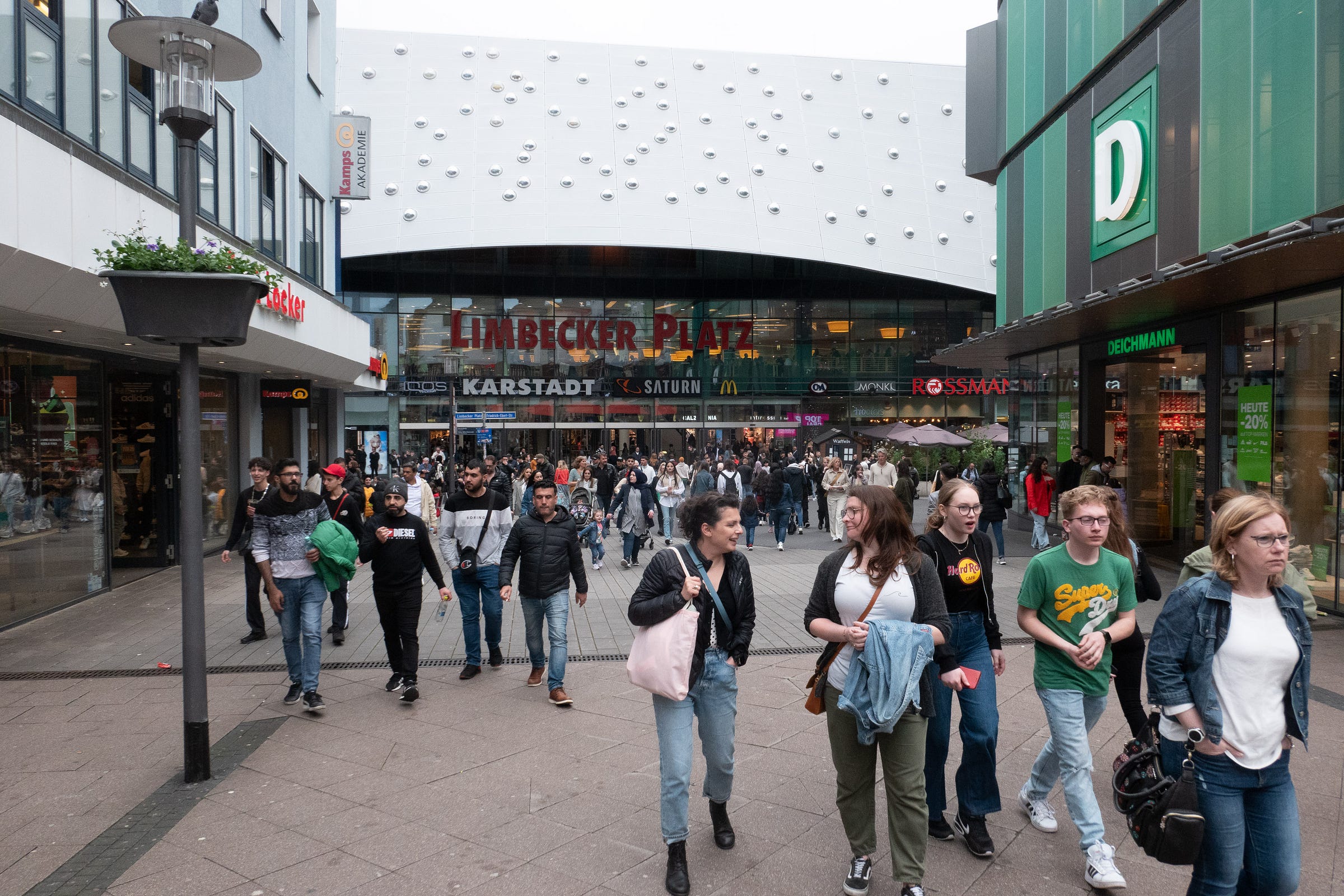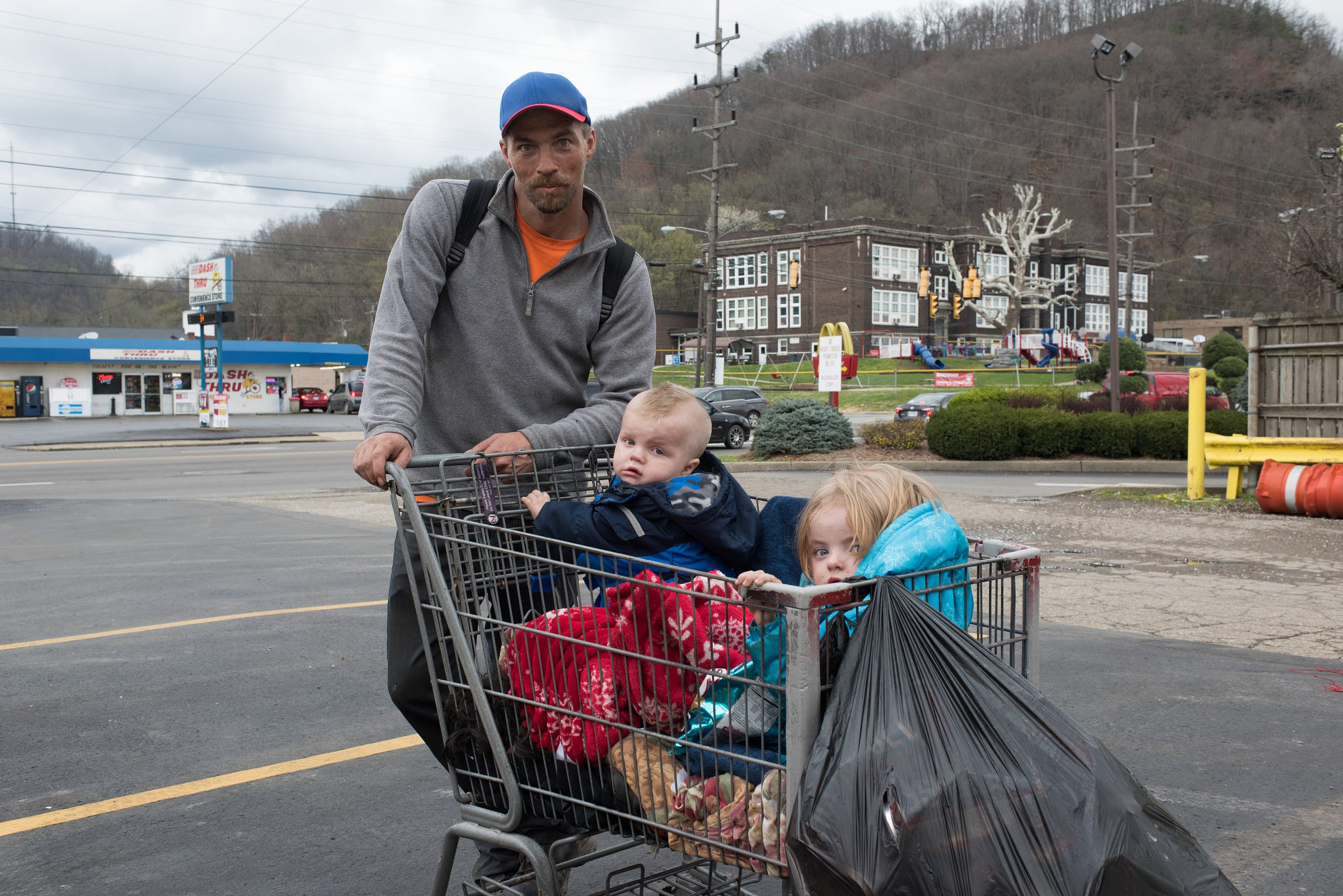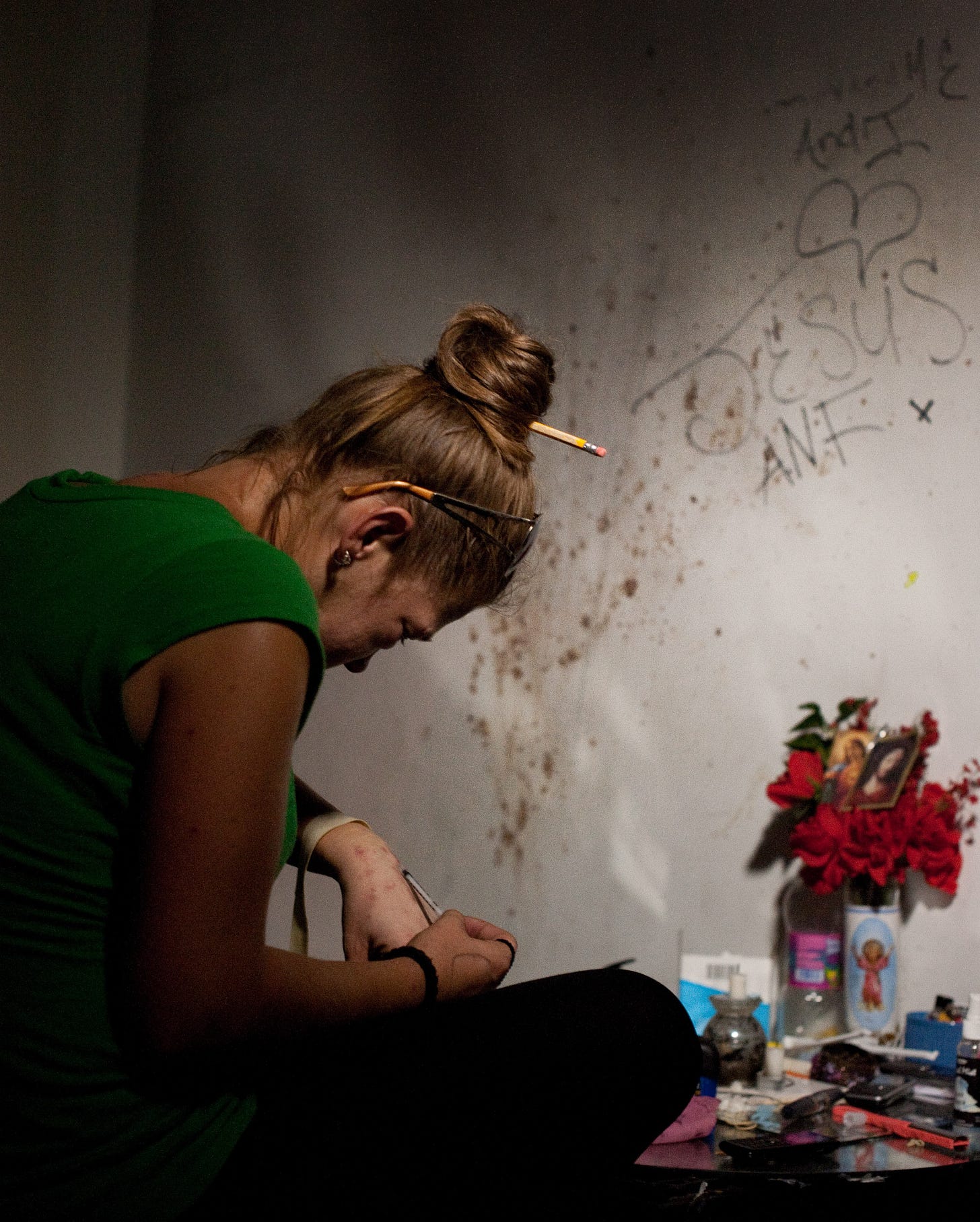Europe is Healthier than US
It's just harder to see that, because Americans look in the wrong place.
The above picture, from a cafe where I rested after a sixteen-mile walk, isn’t anything special. Neither is the town it’s in, Tournon-sur-Rhône, which is my least favorite of the string of mid-sized and smaller towns I stayed in along the Rhône Valley. It’s a loud town, a result of the old expressway, Route Nationale 86, funneling through it, and France’s love of motocross, which means young men sans mufflers.
Yet even in Tournon, on a boring Wednesday afternoon, there was an active social scene, a communal sense of needing to be, if not directly with other people, then at least near them.
Tables of friends, colleagues, couples, families, came and went. Those alone, mostly older regulars, came to sit, watch the world, and chat with other regulars and the wait staff. They were alone in name only. They had their place, quiet literally as I later found out when I realized I’d taken the corner seat of a different regular, who I offered to switch with, but they declined with a smile, muttering something I hoped translated as “I may be set in my ways, but I’m not THAT set.”
I was there for three hours, and while I was alone, I never felt lonely. I also didn’t order much, and I never felt rushed. The French understand the value of sitting for a long time, around others, while doing seemingly nothing.
After this cafe, I went to four others, some packed, others close to empty, but none depressing, because people being social is rarely depressing since it’s central to human happiness. Loneliness, isolation, having no community to be a part of — that’s depressing. That is the kind of despair, akin to being in solitary confinement, that can quickly reach existential levels. To people doing the singular human thing of killing themselves, either slowly with dangerous levels of toxic drugs, or quickly with guns.
The cafe culture, which I saw every day, in every community along the Rhône Valley, is just one example of a very healthy French culture. Of a communal-ism driven not by getting something material from it (work connections!), but rather from being part of a collective, with a shared understanding of who you are, why you are that, and why it’s good to be that. We are French, and this is why we do what we do, and it’s good. It’s a sense of self so ingrained, it’s not explicitly recognized. The water you swim in, but don’t notice.
That sense of knowing who you are, and that you’re a valuable part of something bigger than yourself, that is good, is fundamentally different from the US, where being you, the maximal you that you can possible be, one defined by your own flavor of uniqueness, is central.
Europe, or at least large parts of Europe, is very different from the US in this way, and it’s healthier. You can see that in suicide and mortality statistics, but you can also see it with your own eyes, if you spend time shuttling between the two.
As I’ve emphasized in almost all my essays from walking around the world, we Americans are not a healthy bunch, not physically, or more importantly, mentally. We are a sick and getting sicker country. We have an unnaturally high level of mental illness, both diagnosed, and not. We are addicted to medicines, both legal and illegal, to try and cope with it. We are so far from content that we are currently killing ourselves in record numbers.
Especially if you adjust for how much stuff we have, which is the American argument for America. We have more stuff, which naturally means we are better. But contentment, or happiness, or fulfillment, is in my mind the correct measure of better.
This is my third essay comparing US to Europe, which is the sex scenes of travel writing — usually cringe, usually vapid, but boy oh boy does it sell. The prior two, “US is better than Europe!”1 and “America does not have a good food culture”, are two of my most read essays.
So I guess I shouldn’t have been surprised when a recent post of mine on Notes ended up going as viral as something can go on Notes. Like most social media posts, it was a hastily typed thought lacking nuance, which after an hour I wished I’d written differently. Regardless, I stand by it, and want to use this essay to amend it, while defending its central point.
Here is what I wrote then,
I’ve engaged in this debate before, but anyone who doesn’t see that Europe is so much culturally richer, and healthier, than the US is missing that culture is fundamentally about communities, and the social.
When most people talk about Europe’s culture legacy, and superiority, they point to cathedrals, museums, and such.
But it’s not about the physical (although it makes the stage more dramatic), it’s about the work/life balance. About third spaces that encourage being around people, in a way that’s deeper than a brutal transactionalism.
US is about the individual, to a hyper degree. Everyone is so focused on being emancipated from everything, freed from any “outdated” obligations, that they end up in an empty loneliness.
It’s depressing to come back, after traveling. To see so many communities of one, all trying to figure out why their life feels so empty.
Yes. There is still the social and communal in the US. That’s human nature to build it. But we make it harder to do. Our culture just isn’t conducive to communities.
My first amendment is to recognize that saying Europe versus the US is far too simplified since each contains multitudes. Especially Europe, where Germany is different from France, and within France, Paris different from Valence, and within Paris, Le Marais different from Aubervilliers.
For what I’m discussing though, the most important European difference is between Paris and Valence. Or in Germany, between Frankfurt and Bochum, and in Belgium, between Brussels and Mechelen.
The most common way Americans see Europe is through its biggest cities, and yet that’s the least representative way to understand it. Especially the neighborhoods in those big cities they spend time in.
Big city Europe is in the process of being conformed, changed, and ultimately smoothed into a generic boring singular entity. A soulless Americanization that’s accelerated dramatically over the last few decades. It’s a process driven by globalization, tourism, and secular capitalism.2 What has resulted is a McEurope — a chain of big cities where chunks of each are the same. The branding of the franchises might be a tad different, the scenery a little altered, but these chunks serve up the same bland and drab experience.
The downtowns of cobble stone streets lined with the same stores selling runners, sex toys, raw paninis under glow lamps, absurdly caloric sweets, and whatever else tourists splurge on to feel special.
There is the one dirty plaza of check the box cafes which feels like EPCOT center cosplaying, with signs in English, and almost no regulars, beyond that one stubborn and ancient local, who through the force of time, has crafted their singular island of special.
There isn’t much dignity left in these “historic downtowns” most of it lost by the rush to monetize the mobs. The Hen and Stag parties flown in on Ryan Air. The pub crawls. The line of well scrubbed Americans and Asians scurrying behind a hatted scold yelling into a megaphone and holding a tiny red flag.
Some of the historic buildings, especially the Cathedrals, still have a dignity and heft, cultural buttes in a desert eroded by pagan winds, which can only last so much longer, since many have given over to being museums more than houses of worship. A check mark on tourist lists to justify a day of binge drinking. Attending mass in these churches means pushing your way through these packs of heathens who, if they stick around, watch the service with the bemused glee of a 19th-century anthropologist in Papua New Guinea. It wasn’t good then, and it’s not any better now.3
What McEurope is lacking the most, or what is hardest to see, is the communal-ism that’s central to European culture.
Thankfully though, McEurope is confined to a few neighborhoods, although they are by far the most visited ones. It’s very easy to get away from them, and once away, you will find that a healthy European culture is almost everywhere else, especially the smaller towns. In spades. That’s why my single suggestion for visiting Europe is to get out of the most visited big cities, which contain the largest number of most visited neighborhoods, and go to some random mid-sized town. Some place like Valence in France4, that also, like Paris, has a long history, an ancient and sublime Cathedral, yet hasn’t entirely succumbed to the global forces trying to flatten the world.
There you see the care Europeans still give to living. The care given to being a valued member of something larger than themselves. To being part of a group. To eating well, to relaxing well, to working with a purpose beyond making mint.
The flattening forces sloshing around the world are mostly viewed in economic terms. It’s mostly talked about as big global brands and franchises sweeping across the globe, knocking everything down around it.
There’s a truth to that, although they are symptom of a larger illness, which is ideological and also very American5.
It’s the idea of individual liberation. The idea that everyone needs to be emancipated from everything. Everyone needs to find and fly their freak flag. They need to find their true self and be it. Even if that means severing ties with family, friends, church, Nation, anything and everything that came before. Those are provincial, backwards, and holding you back.
That is the purpose of life. To be free. Yet it’s a perverse goal, a broken Telos, that can only be seen as positive if you have a abnormal sense of what it means to be human. To be human is to be social. The ancient Greeks knew it, the Medievalist knew it, and even the early Liberals knew it, but it’s us moderns who’ve somehow forgotten it.
Once you understand that, then you further understand that the American definition of freedom ends in a state of despair, and nobody should seek that. Much less entire cultures.
True freedom isn’t being so emancipated that you are isolated, it’s the opposite — being part of a group and knowing where you fit in and are valued. Be that a church, a cafe, a family, a club, or a Nation.
In that sense, Europe, outside of the overly visited but insignificant McEurope parts, is freer, and healthier than the US. Most of the rest of the world is.
The second amendment I’d make to my Note is a better explanation of the last paragraph,
Yes. There is still the social and communal in the US. That’s human nature to build it. But we make it harder to do. Our culture just isn’t conducive to communities.
Before I stared walking around the world I spent over a decade focusing on poverty, addiction, and despair in the US. My book Dignity was a result of that work.
During those years I got called the “McDonald’s guy” because I highlighted how much community exisited in them.
The salient point wasn’t that there’s something unique about McDonald’s, or America, but that humans are social animals. We need community so much that we will even build it in environments not intended for it.
Or to put it another way, if you provide humans with a landscape of banal franchises, they will form communities, and construct meaningful relationships, in them.
Think again about McDonald’s. The designed purpose was as a ruthlessly efficient way to get food, whittled down to its most transactional basic. You go in, you get calories, you leave, in as short a time as possible.
Yet, McDonald’s has evolved into community centers, where people even meet to pray, because people require and need that. To their credit, the corporation has recognized this, and changed how they approach their customers, although the higher driving goal is still efficiency.
Fast food franchises are not unique. I’ve seen that need for community in every space I’ve been. From trap houses in the Bronx, to homeless camps under bridges, to donut stores in LA. People form social groups wherever there’s more than one person. It’s one of the quarks of human existence. A cardinal building block6.
Yet in the US, and in McEurope, we view it as something to move beyond. Especially the intellectual class, who have an outsized role in policy and business decisions.7
That doesn’t mean the public doesn’t stop being social, rather it means they have to go out of their way to build connections.
America might have a broken culture, one ideologically committed to individual freedom, but we are still social, but not necessarily in the healthiest ways. Without functional communities to be members of, many, out of desperation, end up gravitating to dysfunctional ones.
Without church, they go to the drug traps; without cafes, bars; without families, politics; without sports clubs, gangs; without friends, angry online forums.
Some, a sadly growing minority, fail completely to find anything to be part of and end up in a state of complete antisocial perversion. A state of depression, confusion, emptiness, and then violence, against others and themselves.
A state that for too many ends in suicide, either quickly, or slowly one needle at a time.
That is a freedom turned into a tyranny of emptiness.
(I’m leaving this weekend for Kampala, then Nairobi. I’m sorry about the brief delay for this essay, but I wanted to publish it to leave enough days in Kampala before the next piece to have something thoughtful to write about.
PS: So far I’ve had a lot of very generous offers from residents of Kampala. I’m not sure what I will find there, but I’m already moved by the kindness of Ugandan strangers. )
Given that headline clashes with this essay (so far) I ask that you read it. It’s both a tongue in cheek headline, but also a different way of looking at how people see the two places.
I know that reeks of buzzword thinness, but it’s true, although in less cartoonish of a way than usually thought about. It’s about an ideological mindset that sees materialism, and individual liberty, as key to human flourishing. I don’t believe that, as I hope to explain further below in the essay.
I’ll never forget excitedly heading to the Cologne Cathedral, only to find a party of 20 or so British women on a Hen party weekend twerking in front of it for a Instagram post
I could suggest many many others. I chose Valence only because it was where I ended my last trip. Avignon for instance, despite having one small McEurope neighborhood, is still a great place.
Most of the things a lot of American tourists, especially on the left, like about Europe — health care, good public transport, walkable cities, less focus on cars, etc — are downstream of the European communal-ism. They are a result of the US focus on rugged individualism.
That is also true in what I call McEurope. There is still community there, in those “soulless” downtowns, it’s just harder to find, and harder to form.
I’m not suggesting the public, or normies, are also not responsible for a lot of our problems. This isn’t an elite only problem. Individualism isn’t only a belief of the intellectuals, although that’s where it originated, and that’s who is most responsible for the propagation of it. But ideas, unlike Economics, do trickle down, and at this point, a rugged, destructive, individualism is central to what the US is.
At it’s best, when tempered with organic community, it’s the American Dream. At worst, it’s constant fighting, constant blame, constant depression.









A powerful piece, Chris. I don't even think Americans have to go to Europe to find what you describe here. Just cross the border to Mexico. The U.S. is a profoundly alienating place. And, as you note, it's literally killing a not insignificant number of our fellow citizens.
I'm not well-traveled enough to protest your conclusions, but aren't you kind of making the same error assessing American culture as you suggest we're all making in our inaccurate assessment of European culture -- that is, relying too much on the homogenized big city experience and too little on the "real world" of small town life? I've got to believe there's still a strong sense of community in places where church picnics, high school band concerts, and summer softball leagues are still very much a part of the culture.